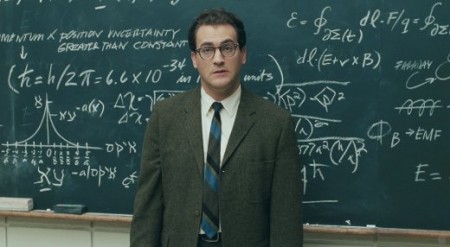
By now the Coen brothers are so great at filmmaking they’re actually scary. They started out twenty-five years ago with massive cinematic talent and the finest sensibilities in the modern world, and they’ve worked and worked till now they can achieve glorious screen effects with such ease, suppleness, and casual precision, it’s overwhelming if you let yourself dwell on it. But A Serious Man doesn’t let you dwell on it till after it’s over. The last shot alone is so moving, so incredible and complex in its impact, it sears itself into your brain like the twin ghost girls in The Shining, and you go home stunned.
In fact I’m still so stunned I can’t possibly do justice to the movie without seeing it again, but I’ll sketch in a few glowing details.
A Serious Man starts off as a gleefully deadpan black comedy, prefaced by a distressing Old Country interlude in an Eastern European shtetl where a husband and wife face a real dilemma. The husband has invited someone to their house whom the wife is convinced is a dybbuk, a wandering member of the living dead. The wife’s confident method of dealing with the visitor and expelling it from their humble home possibly saves the couple from an encounter with evil by shutting it out—or else it might represent their embrace of evil, closing it in with them. Or sorta both, depending on…well, several uncertainties. Tough to tell about these things.
In 1967 suburban Minnesota, a sweetly earnest physics teacher and family man, Larry Gopnik (Michael Stuhlbarg), is also finding the uncertainties of life taxing. He wife (Sari Lennick) abruptly announces she’s leaving him for the pear-shaped Sy Abelman (Fred Melamed), whose maddeningly mellifluous voice constantly assures Larry of Sy’s superior claim to the status of “a serious man.” Larry’s children (Aaron Wolff and Jessica McManus) are typical American-kid monsters of selfishness. His tenure case at the university might be imperiled by a disgruntled Korean student (David Kang) threatening him over a failing grade, that is, if the student is the one who’s sending the scurrilous anonymous letters about him to the tenure committee. His next-door neighbor (Peter Bretimayer) is a heavily armed, crewcut-headed hulk simmering with rage who may or may not be violently anti-Semitic. His other next-door neighbor (Amy Landecker) is a terrifyingly attractive nude sunbather with hypnotic lynx eyes. His chronically unemployed brother Arthur (Richard Kind) has moved in with the fracturing family, and is working on a mysterious mathematical text called the Mentaculus that will unlock the secrets of the universe as well as allowing him to cheat at cards, when he’s not in the bathroom draining an equally mysterious cyst on his neck.
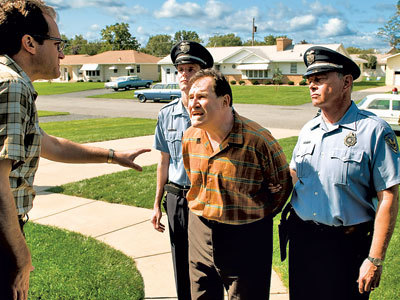
Overwhelmed, Larry turns to his faith and begins making appointments with rabbis. Three rabbis in all, making for a wonderful folk tale structure. The young junior rabbi (played by Simon Hellberg of The Big Bang Theory) urges him to “Look at the parking lot, Larry!” in order to appreciate God’s wonders in even the humblest things. The middle-aged rabbi (George Wyner) tells him the story of “The Goy’s Teeth”, about a dentist who discovers the Hebrew words “Help me” inexplicably inscribed inside the lower front teeth of a gentile patient. What’s it supposed to mean? “The teeth don’t say.”
Finally, the ancient rabbi (Alan Mandell) with a reputation for great wisdom refuses to see Larry because he’s busy “thinking.”
Critic A.O. Scott, who admires A Serious Man, claims it’s a “shaggy dog story” with no significant structure. Ha! Don’t be fooled! The movie’s ill with structure!
While Larry’s going through the world’s most severe mid-life crisis, maybe, or enduring a Job-like series of trials possibly engineered by God to test his faith, his son Danny is also undergoing an important trial of transition, preparing for his bar mitzvah. His studies are impeded by his marijuana use, his attempts to escape the demands for payment of his hulking classmate who’s his pot-dealer, and the distractions of late-‘60s rock and roll. He’s in Hebrew school surreptitiously listening to the Jefferson Airplane song “Somebody to Love,” with its ferocious Grace Slick vocals, when his transistor radio with earphone is confiscated and the song blares out into the classroom:
When the truth is revealed to be lies,
And all the hope within you dies,
Don’t you want somebody to love?
Don’t you need somebody to love?
After his bar mitzvah, Danny gets to see the ancient rabbi, and what comes out of the possibly wise rabbi’s mouth is a recitation of the Jefferson Airplane lyrics. It’s uncanny when it happens. But also completely mundane. Both, with a thrumming tension between the two.
This kind of thing is no sweat for the Coens. They’ve fully understood the way films can build to tremendous emotional impact while the intellect staggers, giving the sense of almost occult understanding that’s hard to put into speech. The shots used to advertise the film are a good example of this. Larry is up on his roof trying to adjust the TV antenna so his son can indulge his passion for the TV show F-Troop, when he looks around his flat sun-bleached suburban neighborhood as if it were revealed to him for the first time in all its maddening strangeness. The perfectly stark shot set-ups give us the same vertiginous sensation. His world, our world, they can’t be real, can they? Must be some mistake, some joke, some delusion. How did we ever get into this fix? What does it all mean?
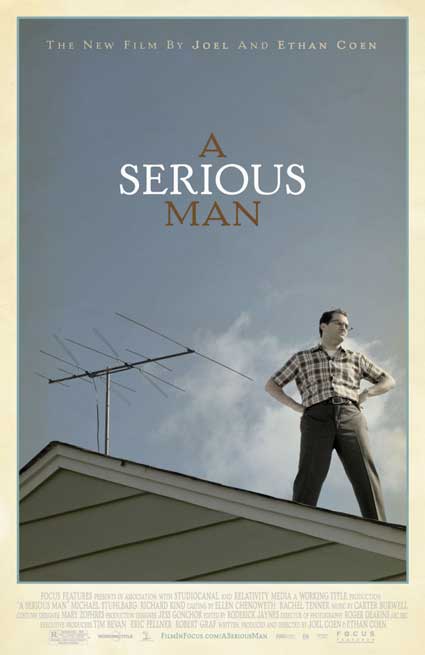
Much is being made of this film as a Coen confessional; they’re finally getting autobiographical on us. They too were raised in a Jewish enclave of suburban Minnesota. They claim Larry somewhat resembles their professorial dad. Those very familiar with Coen brothers’ interviews will recognize the character of daughter Sarah as a tribute to Joel and Ethan’s older sister Deborah, whom they claimed not to know very well because she was always in the bathroom washing her hair.
The Coens are right in their observation that Americans are obsessed with finding out “personal stuff.” As if “the answer” to everything is in the Oprah-like confessionals of childhood strife, pop psychology, and feeling “violated” by something.
But if you know Coen films you also recognize their far more significant recurring themes and motifs tying A Serious Man to Barton Fink, The Man Who Wasn’t There, Miller’s Crossing, Fargo, Raising Arizona, and so on. They consistently examine our human black comedy, trying to figure out what the hell’s going on in the midst of chaos, with death looming up to render it all moot. Maybe.
“The Uncertainty Principle” once again plays its vital part in a Coen film, this time with Larry’s equation on a massive blackboard. In yet another magnificent Coen brothers’ dream sequences, Larry finishes chalking in the impossibly long, difficult equation and turns to face the class, warning them in the perfect nightmare-logic we all know too well:
“Even if you don’t understand it, you’re still responsible for it on the mid-term!”
Oh it’s genius, genius. The Coens really are too good for us.
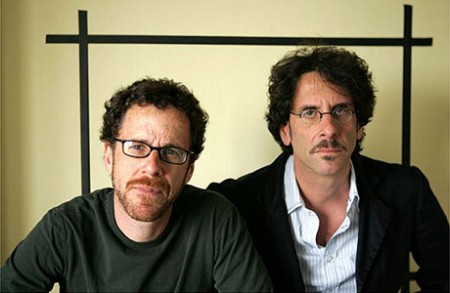
Read more: Ethan Coen, Jefferson Airplane, Joel Coen, The Big Bang Theory, The Shining, Uncertainty Principle, Eileen Jones, movies


Got something to say to us? Then send us a letter.
Want us to stick around? Donate to The eXiled.
Twitter twerps can follow us at twitter.com/exiledonline





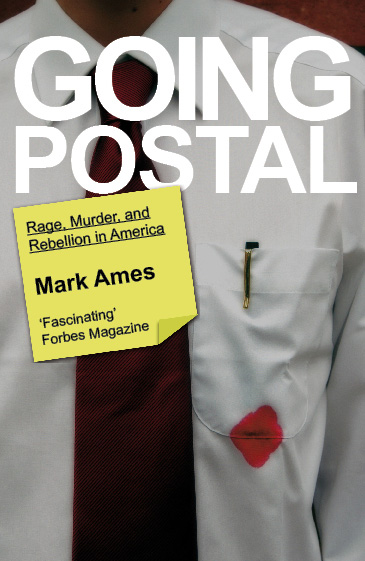









19 Comments
Add your own1. Tereshkova | October 11th, 2009 at 3:25 pm
Larry ‘Gopnik’?
Please. . . .
2. MQ | October 11th, 2009 at 9:35 pm
Why doesn’t Dolan publish as Dolan?
3. Ravenous | October 11th, 2009 at 10:05 pm
It might be good, but unfortunately those who speak Russian will tend to treat the entire film as a collection of gopnik puns.
4. Etienne | October 12th, 2009 at 12:05 pm
Third paragraph, second line: “shtetl”, not “shetl”.
5. Connors | October 12th, 2009 at 1:02 pm
Because it ain’t Dolan. It can’t be.
Moving on, I went to see this movie today. I hated it. This being Columbus Day, the theater was pretty packed, and a lot of people were laughing. But for the life of me, I couldn’t figure out why. I even turned around a few times to study their faces – was the laughter feigned or genuine? I was baffled by how anyone could enjoy the movie. But the fault must be mine, right, because ALL the critics love it!
Lebowski is one of my favorite movies, but this latest Coen flick is shockingly dull and pointless.
6. Connors | October 12th, 2009 at 1:15 pm
BTW, I typically agree with Eileen’s reviews, but I’m just completely baffled by this one. When the movie suddenly ended, I thought it might’ve been a joke or something. Had we seen the actual movie or some sort of fake version of it?
7. Lawrence | October 12th, 2009 at 3:07 pm
Connors = Dolan (=Eileen Jones)
8. Mydick | October 12th, 2009 at 4:32 pm
It’s shtetl not shetl
9. Filler | October 12th, 2009 at 5:15 pm
@4 It’s good to hear from an expert on the shockingly dull and pointless
10. Robert D | October 12th, 2009 at 6:13 pm
Nah, John Dolan and Eileen Jones are not the same person, despite certain similarities in outlook.
There’s an Eileen Jones that turns up on various University film studies websites, and I’m pretty sure that’s the same one writing for Exiledonline.
It’s no secret that the Exiled staff frequently write under psuedonyms, but Eileen Jones isn’t one of them.
Damn, have to wait another month until A Serious Man is in Australian theatres.
11. Nolan | October 13th, 2009 at 7:15 am
What the hell is with all these positive reviews? I don’t go to the Exiled to read praise, if I wanted to hear how brilliant the Coen Brothers are I’d read Roger Ebert or something.
12. Roland | October 16th, 2009 at 7:45 am
Nolan has a point. Exile(d) is a place for denunciations, not praise.
13. Jeff | October 17th, 2009 at 1:28 pm
Though I love the Exile best for its vitriol, somebody’s dislikes are far weightier if you know what they actually approve of- then they stand for something.
14. Rehmat | November 17th, 2009 at 4:06 am
Anyone watched David Hein’s “My Mother’s Lesbian Jewish Wiccan Wedding”?
http://rehmat1.wordpress.com/2009/11/11/my-mothers-lesbian-jewish-wiccan-wedding/
15. Allen | March 6th, 2010 at 9:53 pm
There is an outside chance A Serious Man is nothing more than the Cohen brother’s joke on their audience. But I liked it — I feel like I almost can’t help it. It’s just so lovingly crafted and bizarrely elusive … to the point that I can’t even tell if its a joke or not.
I guess that’s a clever case of form following content, since that’s probably the question Mr.Gopnik is wondering — only about his life.
16. A serious barfing | March 14th, 2010 at 3:30 pm
Reading this criticism, the fawning and personal adulation warns me it actually really isn’t one.
But we all seem to have personal and cultural buttons which when pushed lead to the suspension of the critical faculties.
For instance with Jonas brothers and teenagers, or Coen brothers and the Faculty of Critics 😛
As for the movie, at least the tornado at the end was going somewhere 🙂
17. Deena | May 27th, 2010 at 10:58 pm
A Serious Man = Pynchon’s The Crying of Lot 49. The atmosphere of both are very similar.
18. Robbo | August 12th, 2010 at 9:10 am
People keep saying that the film doesn’t have an ending, of course it has an ending, Larry dies of that medical problem hinted at the beginning of the film, and the town is destroyed by the storm, thats the entire point.
“They consistently examine our human black comedy, trying to figure out what the hell’s going on in the midst of chaos, with death looming up to render it all moot.”
In this case death rendered it all moot, thats why its funny, thats the joke.
19. boson | August 16th, 2010 at 9:48 am
fuckin’ great film. just saw it today.
Leave a Comment
(Open to all. Comments can and will be censored at whim and without warning.)
Subscribe to the comments via RSS Feed